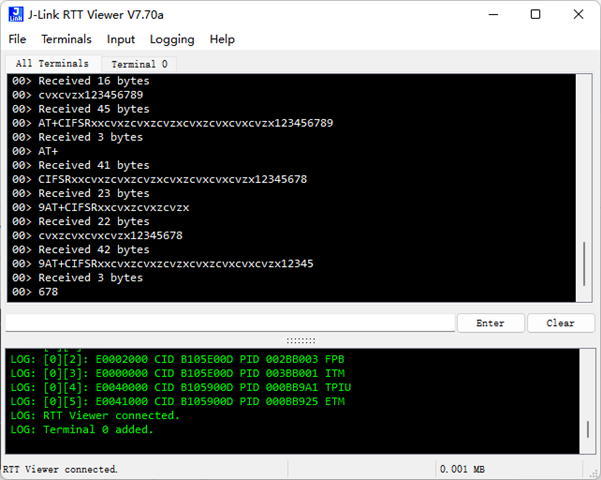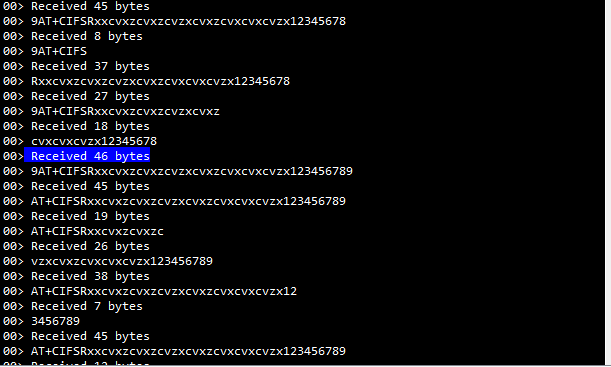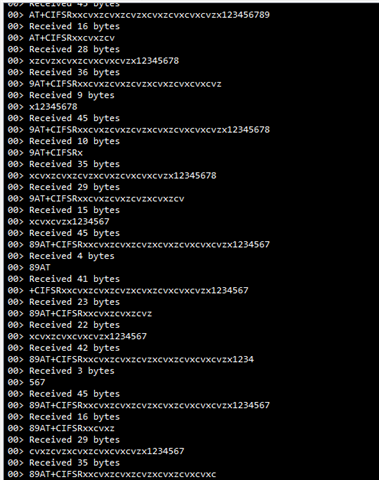I use CONFIG_UART_ASYNC_API feature of NCS v2.0 with nRF52840DK, but when UART_RX_RDY event triggered, evt->data.rx.len is smaller than the number of bytes it has received. I use dslogic tool to analysis uart signal, and print out evt->data.rx.len+2 bytes and can be sure that data is all there, but evt->data.rx.len is just smaller than it should be. And next UART_RX_RDY is only triggered when more data arrives.
**To Reproduce**
related configuations in prj.conf:
CONFIG_SERIAL=y
CONFIG_CBPRINTF_FP_SUPPORT=y
CONFIG_UART_ASYNC_API=y
CONFIG_UART_1_ASYNC=y
uart handler:
void uart1_handler_callback(const struct device *dev,
struct uart_event *evt, void *user_data)
{
// int err;
ARG_UNUSED(dev);
switch (evt->type) {
case UART_TX_DONE:
sent = evt->data.tx.len;
ilog("UART_TX_DONE: %d bytes sent.", sent);
hex_dump2("UART_TX_DONE: ", evt->data.tx.buf, evt->data.tx.len);
k_sem_give(&tx_done);
break;
case UART_TX_ABORTED:
sent = evt->data.tx.len;
ilog("UART_TX_ABORTED: %d bytes sent.", sent);
k_sem_give(&tx_aborted);
break;
case UART_RX_RDY:
received = evt->data.rx.len;
ilog("UART_RX_RDY: %d bytes recved at 0x%x.", received, (unsigned int)(evt->data.rx.buf+evt->data.rx.offset));
hex_dump2("UART_RX_RDY: ", evt->data.rx.buf+evt->data.rx.offset, received);
k_sem_give(&rx_rdy);
break;
case UART_RX_DISABLED:
ilog("UART_RX_DISABLED");
// err = k_sem_take(&rx_buf_released, K_NO_WAIT);
// failed_in_isr |= (err < 0);
k_sem_give(&rx_disabled);
break;
default:
break;
}
}
static void uart1_dorx_thread(void *p1, void *p2, void *p3) {
ARG_UNUSED(p1);
ARG_UNUSED(p2);
ARG_UNUSED(p3);
while (true)
{
if (!device_is_ready(uart1_dev)) {
// printk("UART1 device not ready\n");
k_yield();
k_sleep(K_MSEC(5));
continue;
}
if (get_free_buf(&rxBuf, &tmp_rx, &tmp_rx_len) < 0) {
k_yield();
// printk("no free space in rx buffer.\n");
k_sleep(K_MSEC(5));
continue;
}
const int rx_period = 10;
received = 0;
// printk("uart_rx_enable 0x%x, %d.\n", tmp_rx, tmp_rx_len);
uart_rx_enable(uart1_dev, tmp_rx, tmp_rx_len, rx_period*USEC_PER_MSEC);
while (tmp_rx_len > 0) {
int ret = k_sem_take(&rx_rdy, K_MSEC(rx_period+1));
while (ret != 0) {
ret = k_sem_take(&rx_disabled, K_MSEC(10));
if (ret == 0) {
uart_rx_enable(uart1_dev, tmp_rx, tmp_rx_len, rx_period*USEC_PER_MSEC); // only reenable after disabled.
}
ret = k_sem_take(&rx_rdy, K_MSEC(rx_period+1));
}
if (received > 0) {
tmp_rx += received;
tmp_rx_len -= received;
lba_putdata_len(&rxBuf, received); //no data copy, just modify loop buffer position variables.
ilog("%d bytes put into uart rx buffer.", received);
received = 0;
if (tmp_rx_len < 0) {
ilog("rx: this should never happen! after -%d, %d left", received, tmp_rx_len);
break;
}
} else {
ilog("rx: this should not happen!");
}
}
}
}
I have a 10K loop buffer, the packets are no more than 30 bytes, and another thread is keeping handling data, I can be sure
that buffer is long enough.
**Logs and console output**
Some log:
[17.438] ========== sending packet, id = 12 ==========
[17.447] UART_TX_DONE: 34 bytes sent.
[17.450] UART_TX_DONE: 34 0c 00 a5 86 1b 00 17 00 04 00 09 07 0b 00 02 4...............
[17.458] UART_TX_DONE: 0c 00 29 2a 0d 00 02 0e 00 24 2a 0f 00 02 10 00 ..)*.....$*.....
[17.465] UART_TX_DONE: 27 2a '*
[18.853] ========== receiving packet, id = 12 ==========
[18.856] UART_RX_RDY: 33 bytes recved at 0x20001b2c.
[18.860] UART_RX_RDY: 34 0c 00 a5 86 1b 00 17 00 04 00 09 07 0b 00 02 4...............
[18.868] UART_RX_RDY: 0c 00 29 2a 0d 00 02 0e 00 24 2a 0f 00 02 10 00 ..)*.....$*.....
[18.875] UART_RX_RDY: 27 '
** 0x2a is there acturally. **
[17.730] ========== sending packet, id = 13 ==========
[17.738] UART_TX_DONE: 20 bytes sent.
[17.741] UART_TX_DONE: 34 0d 00 43 71 0d 00 09 00 04 00 09 07 11 00 02 4..Cq...........
[17.749] UART_TX_DONE: 12 00 28 2a ..(*
[19.145] ========== receiving packet, id = 13 ==========
[19.148] UART_RX_RDY: 20 bytes recved at 0x20001b4d.
[19.152] UART_RX_RDY: 2a 34 0d 00 43 71 0d 00 09 00 04 00 09 07 11 00 *4..Cq..........
[19.160] UART_RX_RDY: 02 12 00 28 ...(
** it should have received 21 bytes, but it tell me 20, so another 0x2a at the end of packet is delayed.**
[18.030] ========== sending packet, id = 14 ==========
[18.037] UART_TX_DONE: 16 bytes sent.
[18.041] UART_TX_DONE: 34 0e 00 19 bb 09 00 05 00 04 00 01 08 12 00 0a 4...............
[19.442] ========== receiving packet, id = 14 ==========
[19.445] UART_RX_RDY: 16 bytes recved at 0x20001b61.
[19.450] UART_RX_RDY: 2a 34 0e 00 19 bb 09 00 05 00 04 00 01 08 12 00 *4..............
** 0x0a is delayed too.**
**Impact**
When protocal packet has fixed sizes, I can use a litten trick to work around this, but in other cases it's blocking my way.
It happens quite often, not always though, which means it should be a bug.
**Environment (please complete the following information):**
- NCS 2.0
- nRF52840DK
Please help, thanks:)





